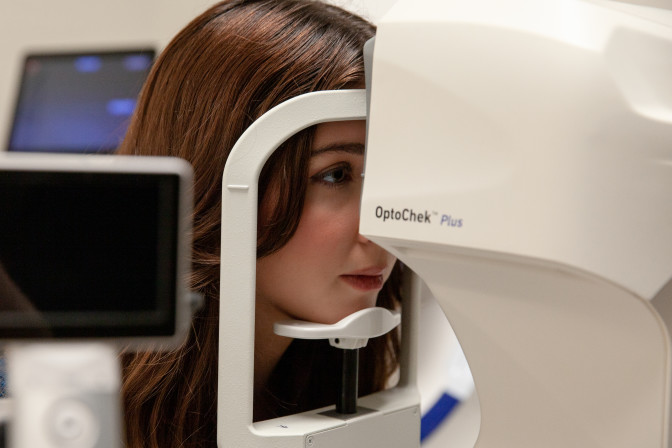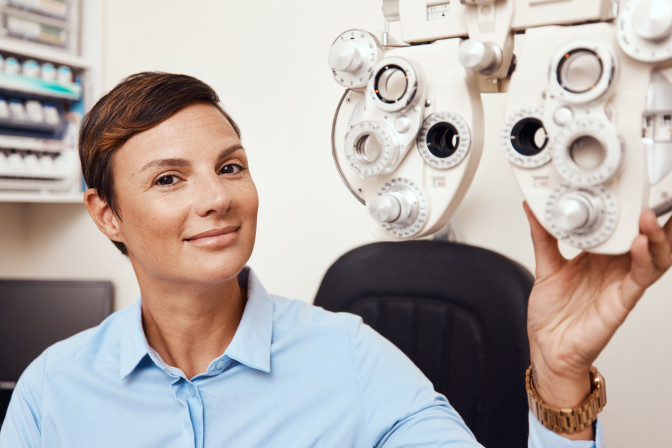Buy One, Get One 50% OFF Eyeglasses
* Restrictions apply. Ask a Team Member for details.
Comprehensive Eye Exam vs. Contact Exam: What's the Difference?
If you are considering going to an eye doctor at Nationwide Vision, it's important to first understand that all visits are not the same. Making an appointment for a comprehensive eye exam can help determine how healthy your eyes are and if your vision has changed. But if you're hoping to also get contact lenses to correct nearsightedness, farsightedness or astigmatism, this exam won't be enough.
The last thing you want is to find out the appointment you've scheduled is not what you expected. When it comes to booking a comprehensive eye exam vs. a contact lens exam, here's what you'll want to know beforehand. Learn more about these two types of exams you can receive at Nationwide Vision, and which is best for you.

Why Should You Get a Comprehensive Eye Exam?
Getting your eyes regularly tested should be a priority. A comprehensive eye exam not only detects changes in vision, but also determines the health of your eyes. While you might expect to notice if something is wrong with your eyes, there are actually some eye diseases that have no obvious signs in the early stages.
Usually, the earlier you catch and treat serious eye conditions, the less likely you are to suffer vision loss. This makes booking an appointment at Nationwide Vision all the more important. Common eye diseases that your optometrist may check for include:
Glaucoma: This includes a group of eye diseases that can result in vision loss due to optic nerve damage.
Cataracts: This is caused by a clouding of the lens and could lead to vision loss.
Age-related macular degeneration: This involves the breakdown over time of a portion of the eye's light-sensitive tissue.
Diabetic retinopathy: This disease damages blood vessels in the eye and if left untreated could lead to blindness.

What Happens During a Comprehensive Eye Exam?
The purpose of a periodic comprehensive eye exam is to maintain your eye's health. During the exam, a Nationwide Vision doctor will check your vision to determine how clearly you are seeing, as well as detect any sight problems and prevent vision loss that may occur if left untreated.
You can expect to undergo a variety of tests, depending on what your doctor feels are necessary. To get a better idea, the Nationwide Vision optical care team will first take a patient history. Then, they may conduct some of the following tests:
Visual acuity test: This helps to determine how well you are seeing and usually involves reading letters off a chart on the wall.
Visual field test: This test will check your vision for possible blind spots.
Testing refraction: This test involves finding the lens power needed for you to see clearly.
Pressure testing: This checks the pressure of your eye and helps to ensure you are not developing certain diseases, such as glaucoma.
Eye dilation: For this, your doctor will administer special eye drops to temporarily expand the pupil. This allows them to see what's going on inside the eye and make sure all the structures are healthy.
Colorblindness test: This will show your doctor if you are having trouble perceiving certain colors.
Stereopsis exam: This tests for depth perception.

Understanding The Contact Lens Exam
If you're hoping to replace your eyeglasses and wear contacts instead, this requires additional tests that are not given during a typical comprehensive exam.
Contact lenses are categorized as medical devices and need specific testing. When scheduling your appointment at Nationwide Vision, let the staff member know that you're seeking contact lenses. Our doctors can often complete the contact lens exam in conjunction with your comprehensive eye appointment.
In the contact lens exam, you can expect your optometrist to do the following:
Conduct tests to be sure you don't have any issues that could interfere with successful lens wear.
Measure the size and shape of your eye to ensure your lenses fit properly and are comfortable.
Measure both your pupils and irises to make sure the lenses fit well.
Measure your cornea, the clear outer surface of your eye, to find the right curvature and size for your lenses. If your eye has an irregular curvature, you may need to be fitted for what's known as a toric contact lens. This can help to compensate for some distortions and provide better vision.
Learn more about Nationwide Vision’s specialty contact lens services
All of this will help your optometrist understand the type of lens and prescription that's best for you. After the initial exam, your optometrist will ask you to come back for a follow-up appointment to be certain that the prescription is working for you and your lenses fit as they should.

Making the Choice: Comprehensive Eye Exam vs. Contact Exam
Even if your contact lens fitting is done at the same time as your comprehensive eye exam, keep in mind that additional testing will take a bit more time and will likely involve an additional fee.
Ultimately, it's up to you to decide what type of appointment is best for your needs. However, the doctors and staff at Nationwide Vision are glad to help and answer any questions. So don't be afraid to call our office and discuss the options before making your choice.

Schedule an Eye Exam at Nationwide Vision
Whether you’re needing a comprehensive eye exam, a contact lens exam and fitting, or both, our optometrists are glad to help. Find a location near you and schedule an appointment today.